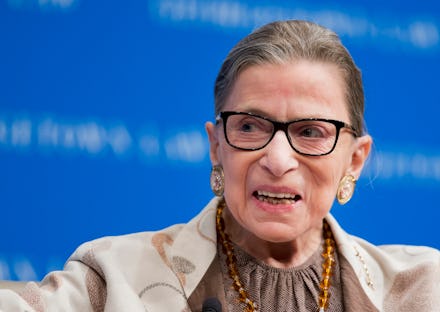How Many Women Should Sit on the Supreme Court? Ruth Bader Ginsburg's Answer Is Badass

Supreme Court Justice Ruth Bader Ginsburg addressed a crowd last week at Georgetown University Law Center, where she discussed her experience as a female law practitioner and shared her thoughts on how many women should really be on the court.
"People ask me sometimes, 'When do you think it will be enough? When will there be enough women on the court?'" Ginsburg said during the talk, filmed by PBS Newshour. "And my answer is: when there are nine."
All nine.
Appointed to the court in 1993 as just the second female justice ever in the court's 226-year history, Ginsburg has seen a lot. But her experience in the field goes back much further than that to when she enrolled at Harvard Law School in 1956 as one of just nine women in a class of 500 students.
"In the ancient days, when I was going to college, the law was not a welcoming profession for women," she said. Ginsburg continued (emphasis added):
"In those days, in the Southern District, most judges wouldn't hire women. In the U.S. attorney's office, women were strictly forbidden in the Criminal Division. There was one woman in the Civil Division. And the excuse for not hiring women in the Criminal Division was they have to deal with all these tough types, and women aren't up to that. And I was amazed. I said, have you seen the lawyers at legal aid who are representing these tough types? They are women."
Would this happen? Maybe, but it would be tough. Four women serving the court since it was founded in 1789 amounts to just 3.5% of all 112 justices. But, given the dramatic increase in female justices over the past few years, the trend is definitely heading in the right direction, even if there is still a lot of work to do.
Classic RBG: The Notorious RBG has never been particularly quiet about her feelings on the Supreme Court and its lack of female representation (only four women have ever served on the court). From her concerns about money in politics to her strong opinions on voter ID laws, Ginsburg has been known to make her voice heard and share her distaste for the court's notoriously problematic mansplaining.
When SCOTUS infamously ruled 5-4 in favor of Hobby Lobby last year, Ginsburg's dissent called the case "a decision of startling breadth" and warned that "the exemption sought by Hobby Lobby and Conestoga would ... deny legions of women who do not hold their employers' beliefs access to contraceptive coverage," and that "the court, I fear, has ventured into a minefield."
Or, in other words:
h/t TPM